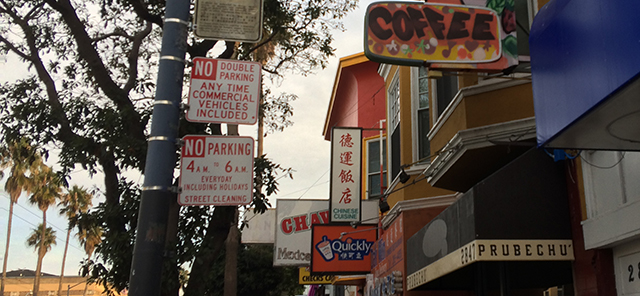 Growing up in San Francisco’s Mission District, MEDA’s Director of Evaluation Carolina Guzman saw a Latino neighborhood built upon waves of immigration from Central America and Mexico. Despite a continuous influx of new residents, there was a constancy to the community’s flavor. This is now in question.
Growing up in San Francisco’s Mission District, MEDA’s Director of Evaluation Carolina Guzman saw a Latino neighborhood built upon waves of immigration from Central America and Mexico. Despite a continuous influx of new residents, there was a constancy to the community’s flavor. This is now in question.
“Things are changing too fast, with the Mission’s long-time identity threatened,” laments Guzman. “The neighborhood shifts are drastic and unnerving for longtime residents and small-business owners.”
Knowing the urgency of the situation, Guzman and her top-notch team have been conducting comprehensive Mission neighborhood surveys, with trenchant data being garnered so that MEDA can best tailor its service-integration model of free services at Plaza Adelante, the Mission neighborhood center.
One such survey, with the goal of better understanding the needs of microbusinesses, was just completed. Funding was from the National Association for Latino Community Asset Builders (NALCAB). Guzman has long seen such small, community-serving businesses as the fabric of the neighborhood. The idea was to ascertain need so that owners could be helped to stay in the Mission, growing their businesses and employing community residents.
With the U.S. Census Bureau findings that 73 percent of businesses in San Francisco employ fewer than 10 workers, the need to keep microbusinesses strong is apparent
To streamline the findings, MEDA’s evaluation team deemed it best to survey businesses that have no more than five employees, that are owned by low- or moderate-income, Spanish-speaking entrepreneurs and that provide the sole source of household income. Another criterion was that the business owner was willing to improve their venture by working with MEDA’s four-decades-old Business Development program.
Bilingual, bi-cultural workers were sent out in the field for one-on-one surveys, with 101 small businesses participating. The majority of the respondents were female and ran retail ventures.
When it comes to daily stressors of business ownership, concern about paying commercial rent ranked high at 58 percent, not surprising in ever-pricey San Francisco, especially the trendy Mission. One dismayed respondent revealed their story by stating, “My landlord raised my rent and all I said was ‘OK.’ I didn’t try to negotiate, when in reality it is not OK. This affects me!”
There was the same level of concern around paying commercial taxes, also at 58 percent.
Interestingly, addressing new mandates around health care coverage (Affordable Care Act) and the increase in the minimum wage are of much less concern for these respondents (28 percent and 25 percent, respectively).
Understanding the need for capital for microbusinesses, MEDA applied for and received an $800,000 grant, from the U.S. Department of Health and Human Services Community Economic Development Program, to launch a revolving loan fund for local and minority small businesses and startups to create jobs. With over $400,000 of this grant dedicated as seed capital to lend, MEDA will launch a Mission Community Loan Fund in January 2015 for the purpose of directly providing capital to businesses that need it most to grow, but may have barriers to accessing funds elsewhere.
This survey found that while these Mission businesses operate in an area that is action-central for all things tech, entrepreneurs showcase a paucity of adequate technical tools to compete. A dire need was discovered in the realm of having an online presence, with a mere nine percent of those surveyed having a company website. Social media marketing was also lacking, although 43 percent did claim to positive feedback on Yelp, the crowd-sourcing website for reviews.
Guzman, hoping the neighborhood she grew up in can maintain its identity, summarizes the need of Mission microbusinesses in 2014 as follows: “Survey respondents shared that small, Latino-owned businesses need accessible, low-interest rate loans to expand and repair their businesses. They need technology to manage and operate their finances and human resources. They need an active presence in social media to market and promote their services. Most importantly, they need to feel safe from displacement because of rent or taxes increases. MEDA is about solutions.”





